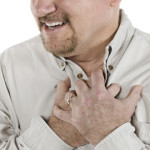
Gastroesophageal reflux disease (GERD) can be caused by a number of different things and certain factors could put you at an increased risk for developing the disorder. Hiatal hernia and GERD commonly occur together and correction of the hernia often resolves GERD.
What is a Hiatal Hernia?
A hiatal hernia is when part of your stomach pushes upward through your diaphragm. Normally, your diaphragm has a small opening, called the hiatus. Your esophagus passes through this hiatus just above the level where the esophagus connects to the stomach. A hiatal hernia develops when part of your stomach pushes up into the chest and through that opening. There are two types of hiatal hernias—sliding and paraesophageal.
Possible causes of Hiatal Hernias include:
- Weakened muscle tissue
- Injury to the area
- Chronic and intense pressure on the surrounding muscles
- Being born with an abnormal or unusually large hiatus
- Smoking
Hiatal hernias are generally common in individuals who are obese or over the age of 50.
Symptoms of a Hiatal Hernia and GERD
Generally, small hiatal hernias won’t present any symptoms. You may have lived with a hernia for years without even knowing it until discovered by a doctor or medical professional. However, if the hernia is larger, it will cause greater than normal pressure on the stomach and force stomach contents through the valve at the junction of the esophagus and stomach. This allows undigested foods and stomach acid to come back into your esophagus. This is when GERD develops. When this occurs, you will most likely experience the frequent symptoms of GERD including:
- Burning sensations in the chest
- Sore throat
- Difficulty swallowing
- Frequent burping or belching
Treatment of Hiatal Hernia and GERD
Normally, small hiatal hernias go unnoticed and do not require medical treatment. However, if GERD has developed and symptoms persist, it may mean that the hernia is larger and should be treated. Treatments for the condition begins with controlling the symptoms that accompany it. These symptoms are usually associated with GERD so treatment options include:
- Over the counter medication. This includes basic antacids and digestive aids.
- Prescription medication. Prescriptions from your doctor will usually include proton pump inhibitors and H2 blockers.
- Lifestyle changes. Changing your eating and sleeping habits is an important step in treatment. Quitting smoking and losing weight can also be helpful in treating GERD and a hiatal hernia.
These treatments should ease your symptoms of GERD and will also help to heal the lining of the esophagus and the surrounding (weakened) tissue and muscles if stomach acid has damaged them.
If the above treatments don’t manage symptoms well enough, hernia surgery (usually in addition to GERD surgery) is usually necessary to repair the hernia. This surgery involves putting your stomach back into your abdomen and making the hiatus smaller to prevent reoccurrence.
If you have been experiencing painful and disruptive symptoms of GERD and are concerned that you may be suffering from a hiatal hernia it is important to seek medical treatment. Dr. Bagnato can then help with a treatment plan to ensure that your day to day life is no longer interrupted by uncomfortable GERD.



